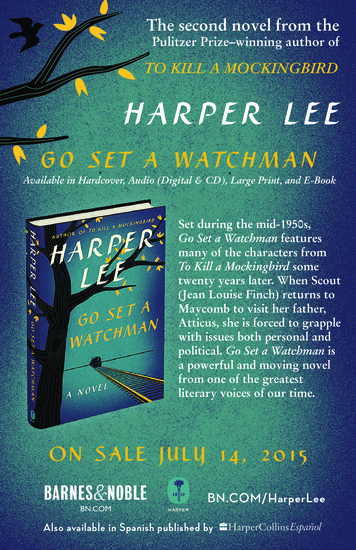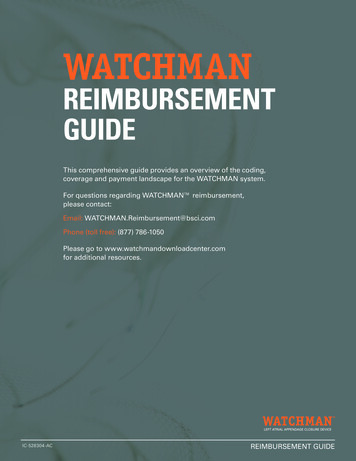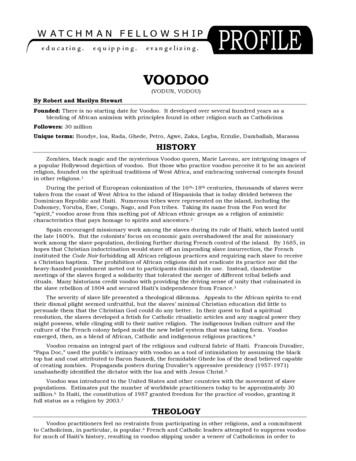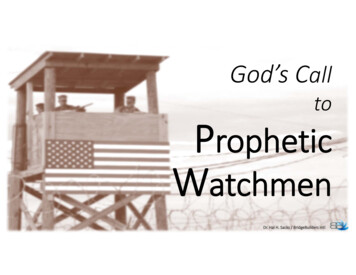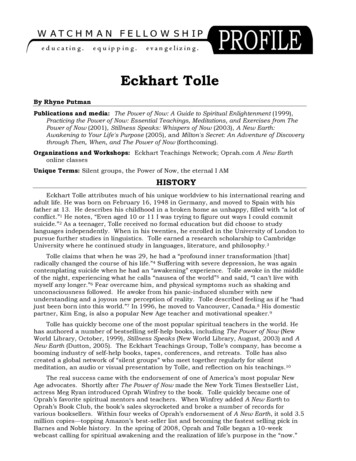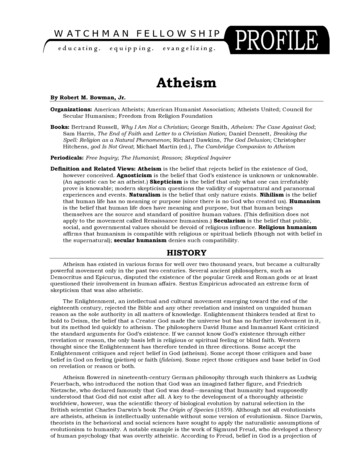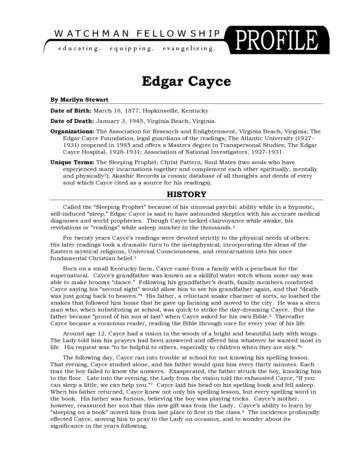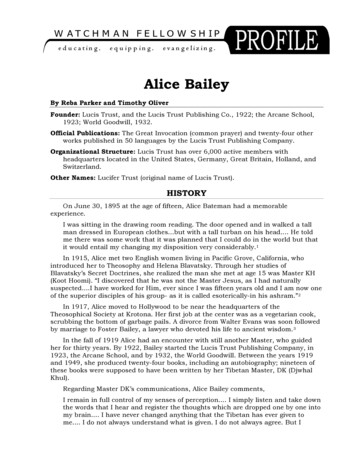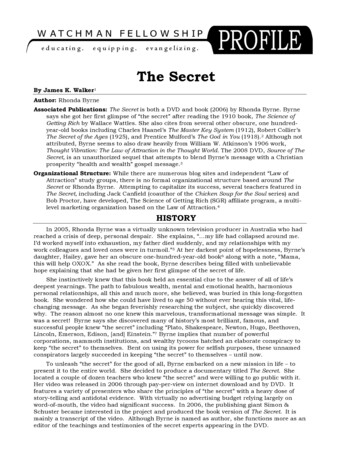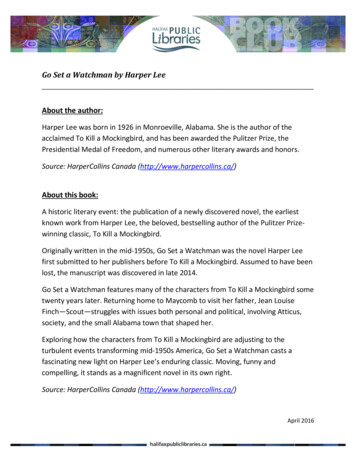
Transcription
Go Set a Watchman by Harper LeeAbout the author:Harper Lee was born in 1926 in Monroeville, Alabama. She is the author of theacclaimed To Kill a Mockingbird, and has been awarded the Pulitzer Prize, thePresidential Medal of Freedom, and numerous other literary awards and honors.Source: HarperCollins Canada (http://www.harpercollins.ca/)About this book:A historic literary event: the publication of a newly discovered novel, the earliestknown work from Harper Lee, the beloved, bestselling author of the Pulitzer Prizewinning classic, To Kill a Mockingbird.Originally written in the mid-1950s, Go Set a Watchman was the novel Harper Leefirst submitted to her publishers before To Kill a Mockingbird. Assumed to have beenlost, the manuscript was discovered in late 2014.Go Set a Watchman features many of the characters from To Kill a Mockingbird sometwenty years later. Returning home to Maycomb to visit her father, Jean LouiseFinch—Scout—struggles with issues both personal and political, involving Atticus,society, and the small Alabama town that shaped her.Exploring how the characters from To Kill a Mockingbird are adjusting to theturbulent events transforming mid-1950s America, Go Set a Watchman casts afascinating new light on Harper Lee’s enduring classic. Moving, funny andcompelling, it stands as a magnificent novel in its own right.Source: HarperCollins Canada (http://www.harpercollins.ca/)April 2016
Discussion Questions:1. Go Set a Watchman takes place more than twenty years after To Kill aMockingbird begins. When Wa t c h m a n opens, Jean Louise Finch—nowtwenty-six and living in the North, in New York City—is returning to herhometown of Maycomb, Alabama. Describe the Maycomb of Go Set aWatchman. If you have read Mockingbird, has the town changed in theintervening years? If so, how?2. Harper Lee writes, “Until comparatively recently in its history, MaycombCounty was so cut off from the rest of the nation that some of its citizens,unaware of the South’s political predilections over the past ninety years, stillvoted Republican.” What are these predilections, and where do theyoriginate? What is Harper Lee telling us about the period and the politics andattitudes of this small Southern town?3. Maycomb is a town without train service, and its bus service “was erratic andseemed to go nowhere.” How does this lack of connection isolate the citizensof Maycomb, and how does that isolation affect how they see themselvesand outsiders? Early in the novel, her longtime friend Henry Clinton tells her“you’re gonna see Maycomb change its face completely in our lifetime.”What does he foresee that Jean Louise cannot—or perhaps does not want tosee?4. Think about the extended Finch family. What is their status in Maycomb?What is the significance of being a Finch in this small Southern town? Does itafford them privileges—as well as expectations of them and responsibilities—that other families do not share? Do the Finches have freedoms that othersdo not enjoy?April 2016
5. Describe the Jean Louise Finch of Watchman. How does this grown-upwoman compare to her younger self ? How does Jean Louise conform—ornot—to the ideal of womanhood in the 1950s? What was that ideal?Compare her to her Aunt Alexandra and the women of Maycomb. Does shefit in with these women? What did you learn about them at the Coffee socialthat Aunt Alexandra hosts in Jean Louise’s honor? In both Mockingbird andWatchman, Alexandra tells Jean Louise that she is part of a genteel family andthat she must at like a “lady.” How did ladies “act” in the first half of thetwentieth century and is there such a thing as a “lady” today?6. Has living away from Maycomb—and in a place like New York—had animpact on Jean Louise? What does she think about New York and life there?What does the big city offer her that Maycomb does not—and vice versa?Now that Atticus is older and suffering from arthritis, why doesn’t Jean Louisemove back to Maycomb permanently? “Maycomb expected every daughterto do her duty. The duty of his only daughter to her widowed father after thedeath of his only son was clear: Jean Louise would return and make her homewith Atticus; that was what a daughter did, and she who did not was nodaughter.” What responsibilities do children—especially female children—owe their parents?7. Describe the relationship between Jean Louise and Atticus at the beginningof the novel. Does Jean Louise idealize her father too much? How does shereact when she discovers that her father is a flawed human being? How doesthis discovery alter her sense of herself, her family, and her world? By thenovel’s end, how do father and daughter accommodate each other?8. Talk about the Atticus portrayed in Go Set a Watchman. If you readWatchman first, how might the novel color your ideas about the Atticus Finchin To Kill a Mockingbird? What was your reaction to some of the opinions hevoices in Watchman? Do they make him a more realistic—if less heroic—April 2016
character than that portrayed in Mockingbird? Is Atticus racist? Would heconsider himself to be racist?9. “Integrity, humor, and patience were the three words for Atticus Finch.” Afteryour reading of Watchman, do these three words still hold true? What wordswould you use to describe him?10. What are Jean Louise’s feelings toward Henry Clinton? Would he make agood husband for her? Both her aunt and her uncle tell her that Henry isn’t“suitable,” that he “is not her kind.” What do they mean, and what does itmean to Jean Louise? Is it strictly because of Henry’s background or is theresomething more? What adjectives would you use to describe Henry’scharacter?11. Is Henry like Atticus, his mentor and friend? Is Jean Louise’s assessment ofHenry later in the novel correct? Are Henry and Atticus good men? Can yoube a moral person and hold views that may be unacceptable to most people?How do Atticus’s actions toward the blacks of Maycomb compare with hisviews about them?12. Why does Maycomb have a citizens’ council, and why does this upset JeanLouise when she discovers that nearly everyone in town belongs to it? Byallowing the likes of a racist segregationist like Grady O’Hanlon to speak atthe meeting, are Atticus and Henry defending O’Hanlon’s First Amendmentright to free speech—or are they condoning his message?13. Harper Lee writes, “Had she been able to think, Jean Louise might haveprevented events to come by considering the day’s occurrences in terms of arecurring story as old as time: the chapter which concerned her began twohundred years ago and was played out in a proud society the bloodiest warand harshest peace in modern history could not destroy, returning, to beApril 2016
played out again on private ground in the twilight of a civilization no wars andno peace could save.” Why would this realization have helped Jean Louise?Are we still fighting the Civil War today?14. Harper Lee offers a window into Jean Louise’s turmoil after she attends thecitizens’ council meeting. “Had she insight, could she have pierced thebarriers of her highly selective, insular world, she may have discovered thatall her life she had been with a visual defect which had gone unnoticed andneglected by herself and by those closest to her: she was born color blind.”Why is Jean Louise’s color blindness a “visual defect”? How does being colorblind shape who she is and how she sees the world?15. Trying to reconcile the knowledge Jean Louise has learned with her views ofthose she loves forces her to confront painful questions. “What was thisblight that had come down over the people she loved? Did she see it in starkrelief because she had been away from it? Had it percolated graduallythrough the years until now? Had it always been under her nose for her tosee if she had only looked? No, not the last.” What makes her say no to thisquestion? And finally, “What turned ordinary men into screaming dirt at thetop of their voices, what made her kind of people harden and say ‘nigger’when the word had never crossed their lips before?” What answers can yougive her?16. What kind of reception does Jean Louise receive in the Quarters when shevisits Calpurnia, the Finches’ retired housekeeper? How does Calpurnia reactto seeing Jean Louise, and what is Calpurnia’s response when Jean Louise asksher how she truly felt about her family? Would Calpurnia have answered thesame way if asked that question a few years earlier—or if asked a few yearslater?April 2016
17. Near the novel’s end, Jean Louise questions herself. “Everything I have evertaken for right and wrong these people have taught me—these same, thesevery people. So it’s me, it’s not them. Something has happened to me.” Doyou agree with her? Has she changed—or is she truly the person who she wasraised to be? Atticus tells her, “I’ve killed you, Scout. I had to.” What does hemean?18. Do you think that the white community of Maycomb sees itself as beingvictimized in Go Set a Watchman? How do these people justify this belief—and how does this belief justify their attitude and behavior toward theemerging Civil Rights movement and those who are a part of it, especially theblack people of Maycomb?19. Go Set a Watchman was written three years after the landmark SupremeCourt decision in Brown v. the Board of Education. How did that decisionimpact the nation and especially the South? What is Jean Louise’s opinion ofthat decision? What about Atticus’s? How do their responses reflectcomments about Supreme Court decisions involving minority rights in ourown time? What does this tell us about ourselves as Americans and about ourviews of race today?20. Consider the novel’s title, Go Set a Watchman. What is its significance? Whydo you think Harper Lee chose this as her title for the book? Though it isfiction, the book is a historical document of its time. What does reading it tellus about the modern Civil Rights movement and its effect on the South?What lessons does the book offer us in understanding our own turbulenttimes?21. How have our attitudes about race evolved since the 1950s when Watchmanwas written? In what ways have we progressed? Is the stain of racismApril 2016
indelible in our national character, or can it eventually be erased? Can it beeradicated for good?22. Late in the novel, Uncle Jack tells his niece, “Every man’s island, Jean Louise,every man’s watchman, is his conscience.” What wisdom is he imparting toher? Uncle Jack also calls Jean Louise a “turnip-sized bigot.” Is she? Why?23. Did reading Go Set a Watchman deepen your understanding of To Kill aMockingbird? How are the two books linked thematically? Talk about theexperience of reading Go Set a Watchman. Does it stand as a companion toMockingbird?Source: LitLovers (www.litlovers.com)Other formats available at Halifax Public Libraries:-Audiobook (on CD and as digital download)eBookFrenchLarge PrintApril 2016
Originally written in the mid-1950s, Go Set a Watchman was the novel Harper Lee first submitted to her publishers before To Kill a Mockingbird. Assumed to have been lost, the manuscript was discovered in late 2014. Go Set a Watchman features many of the chara
